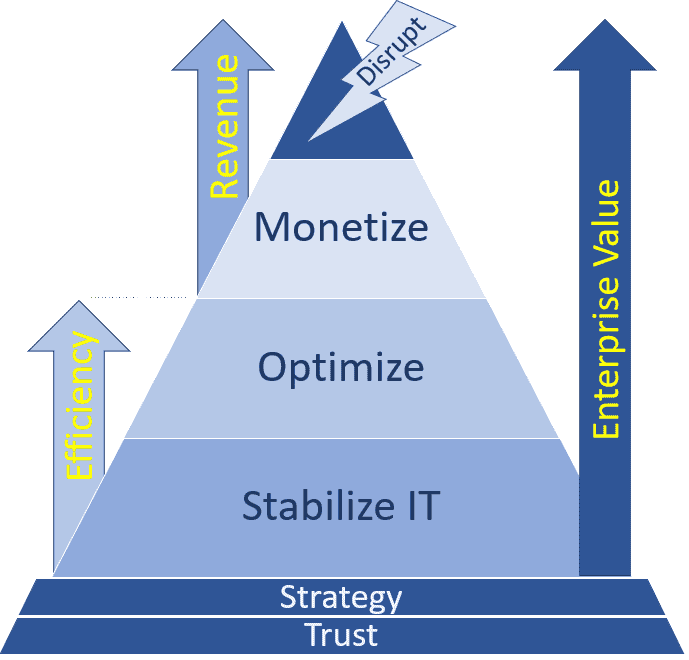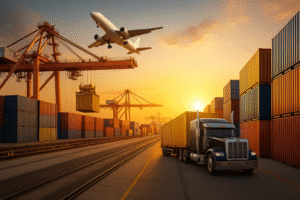Logistics IT & AI Consulting
Proven IT Leaders with Track Records in the Logistics & Transportation Industries
Logistics IT & AI Experts
Logistics and transportation are the arteries of the global economy, moving goods by land, air, and sea (or increasingly, multi-modal) with increasing complexity and speed. Today, success in this sector depends on technology that enables visibility, efficiency, and reliability across every step of the supply chain.
Through our flagship Contract CIO+® tech leadership service and our foundational CIO IQ® IT & AI Advisory offering, Innovation Vista provides independent vendor-neutral IT & AI strategy to the Logistics & Transportation industry. Our consultants bring both technical depth and hands-on experience leading IT across freight carriers, distribution centers, and logistics platforms. We know where general IT best practices are useful – and where logistics requires unique strategies, such as deploying IoT for real-time shipment tracking, optimizing multi-modal routing, or integrating warehouse and inventory systems for seamless flow.
Unlike firms that send in generalists, our experts understand the stakes of logistics: a delayed shipment or failed system can ripple across entire supply chains. With Contract CIO+®, the goal extends beyond stabilizing and optimizing technology platforms — it’s about ensuring IT delivers real-time insight, resilience, and performance to keep goods moving and customers satisfied.
State of Innovation in Logistics & Transportation
Our 2026 Summary of Innovation in the Logistics industry
The Predictive Chain & The Green Mandate
The Logistics sector in 2026 has graduated from simple visibility to predictive intelligence. The winners are those who can anticipate disruptions before they happen and prove their sustainability to clients.
From “Where is it?” to “When will it break?”: Real-time tracking is now table stakes. The competitive edge in 2026 lies in predictive AI that alerts operators to weather delays, port congestion, or maintenance issues hours before they impact the schedule.
The Scope 3 Data Crunch: Sustainability is now a license to operate. Shippers and enterprise clients demand granular carbon reporting (Scope 3 emissions) for every load. Logistics providers unable to provide automated, auditable ESG data are being cut from major RFPs.
Cybersecurity as Critical Infrastructure: Supply chains remain the #1 target for ransomware. In 2026, “Operational Resilience” is the priority. 3PLs and carriers are implementing rigorous segmentation to ensure that a hack in the back office doesn’t shut down the warehouse floor.
The Warehouse Automation Shift: With labor shortages persisting, the “Augmented Warehouse” is standard. Collaborative robots (“Cobots”) and vision-picking AI are working alongside humans to handle increased throughput without increasing headcount.
Interested in Leveraging Some of these Tech Capabilities? An Assessment Could Be Step 1.
Is your tech platform and organization ready to scale and advance? Many of our clients choose to start with an IT & AI Assessment and Recommendations report.
This is a high-leverage first step to gain actionable insights from our Logistics consulting team, validate your current IT and AI readiness, and discover how our expert collaboration can drive value for your organization’s future.
Transportation Leaders First - Then Tech Leaders
Our Unique "Top-line ROI" Approach to Logistics Technology
Many consulting firms focus narrowly on Stabilizing IT systems, hardening cybersecurity, and Optimizing infrastructure costs. While those steps are important, logistics and transportation demand more – technology must enable coordination across carriers, warehouses, and customers in real time.
With Contract CIO+® and CIO IQ®, we begin by tying IT strategy directly to your operational goals. For a freight company, that may mean automating scheduling and fleet management. For a warehouse operator, priorities often involve robotics, inventory tracking, and throughput efficiency. For a global logistics provider, it may center on integrating air, sea, rail, and trucking systems into a unified platform. Each business model has different challenges, and the technology roadmap must adapt accordingly.
Where we bring the most impact is in Monetizing technology. We help clients Innovate Beyond Efficiency® by using IT and data to improve revenue, customer loyalty, and market share. That can mean predictive analytics to optimize routing, customer portals that enhance transparency, or IoT-driven visibility that commands premium pricing. In logistics, technology is more than a cost center – it is a differentiator that determines reliability, profitability, and long-term growth.
IT & AI Strategy for Your Logistics Niche
Transportation Sectors Covered
- DoT, FMCSA, FAA, FMC, FRA audit compliance
- Freight services
- Distribution Centers
- Rail freight
- Air freight
- Sea freight
- Truck freight
- Multi-modal shipping
- Cargo shipping
- Inventory Management
- Warehouse operations
- Complex route optimization
- Custom software & model development
Latest Logistics & Transport Tech !nsights from Our Team:
Analytics Maturity in Logistics · Analyzing our Mid-market Survey
Our experience in Logistics & Transportation tech consulting confirms that these firms sit at the heart of the supply chain, where efficiency is everything and margins are thin. Companies in this sector manage fleets, warehouses, and multimodal operations that generate massive volumes of data. With rising customer expectations for visibility and speed, technology maturity is becoming the difference between leaders and laggards. The recent update to our Mid-market Analytics Maturity Survey provides a three-year lens (2023–2025) on how Logistics & Transportation firms are progressing across Data, Business Intelligence (BI), and Artificial Intelligence (AI). The findings show steady gains in data and BI monetization, and rapid growth in AI adoption, where predictive routing, maintenance, and real-time tracking are reshaping business models.



